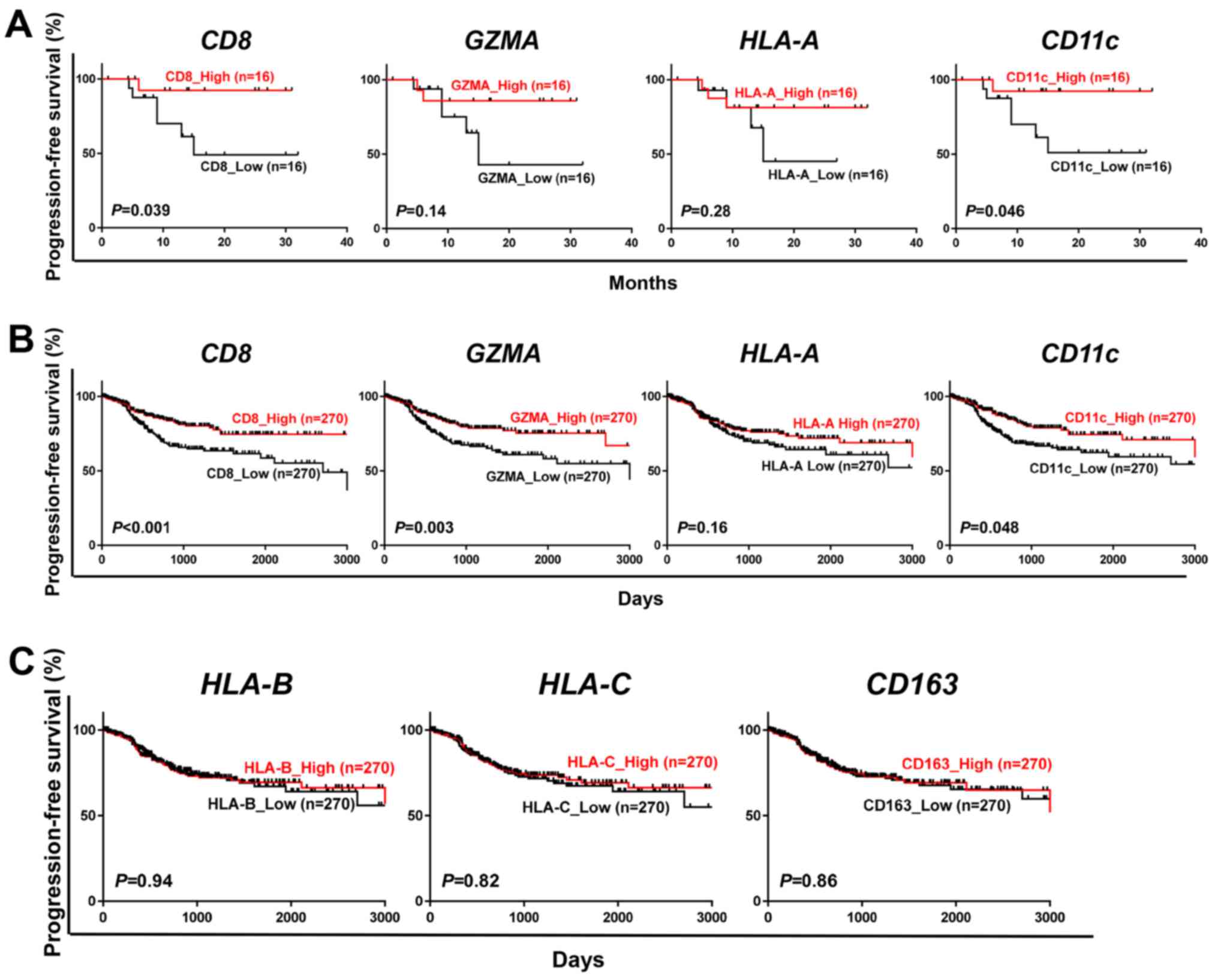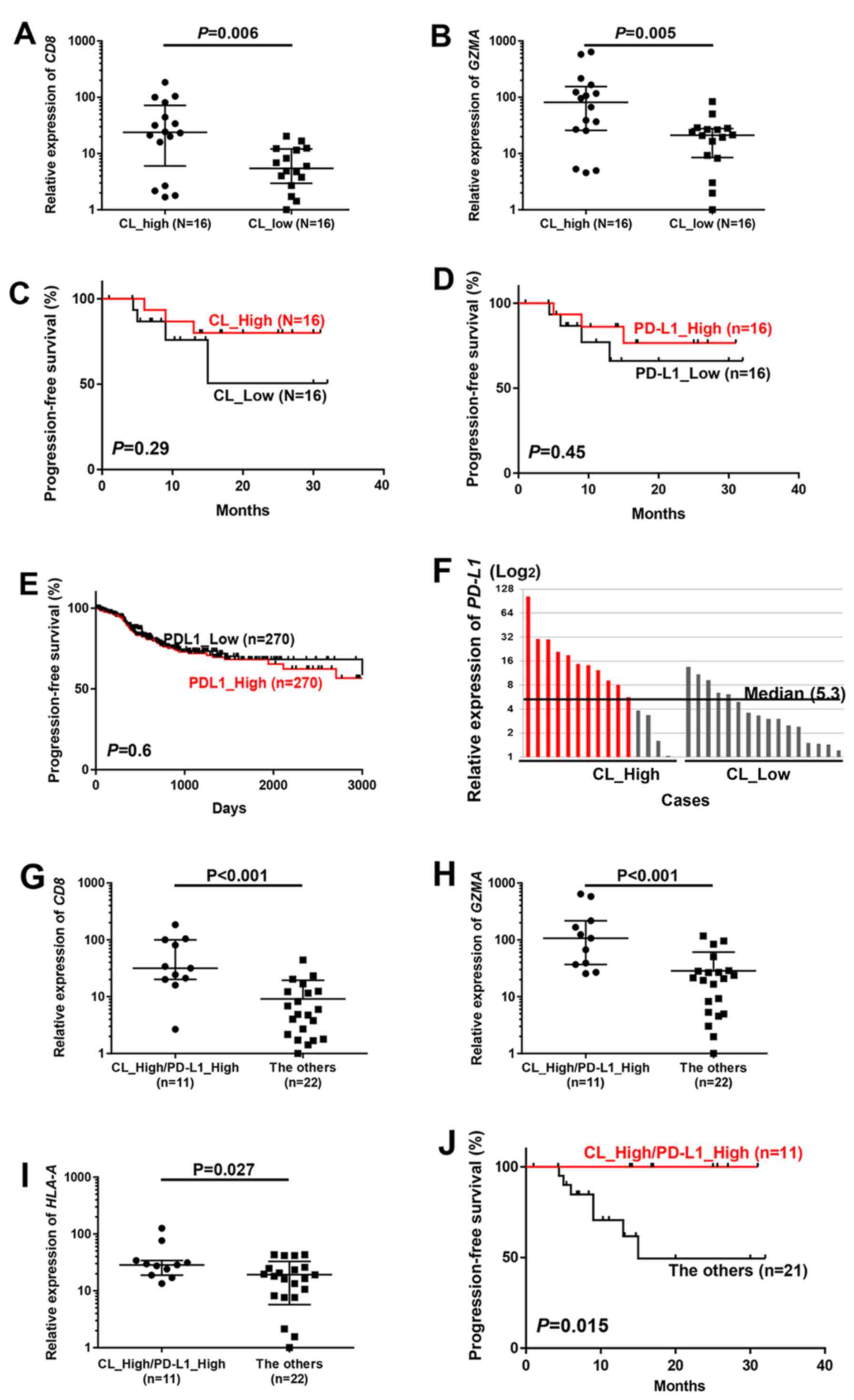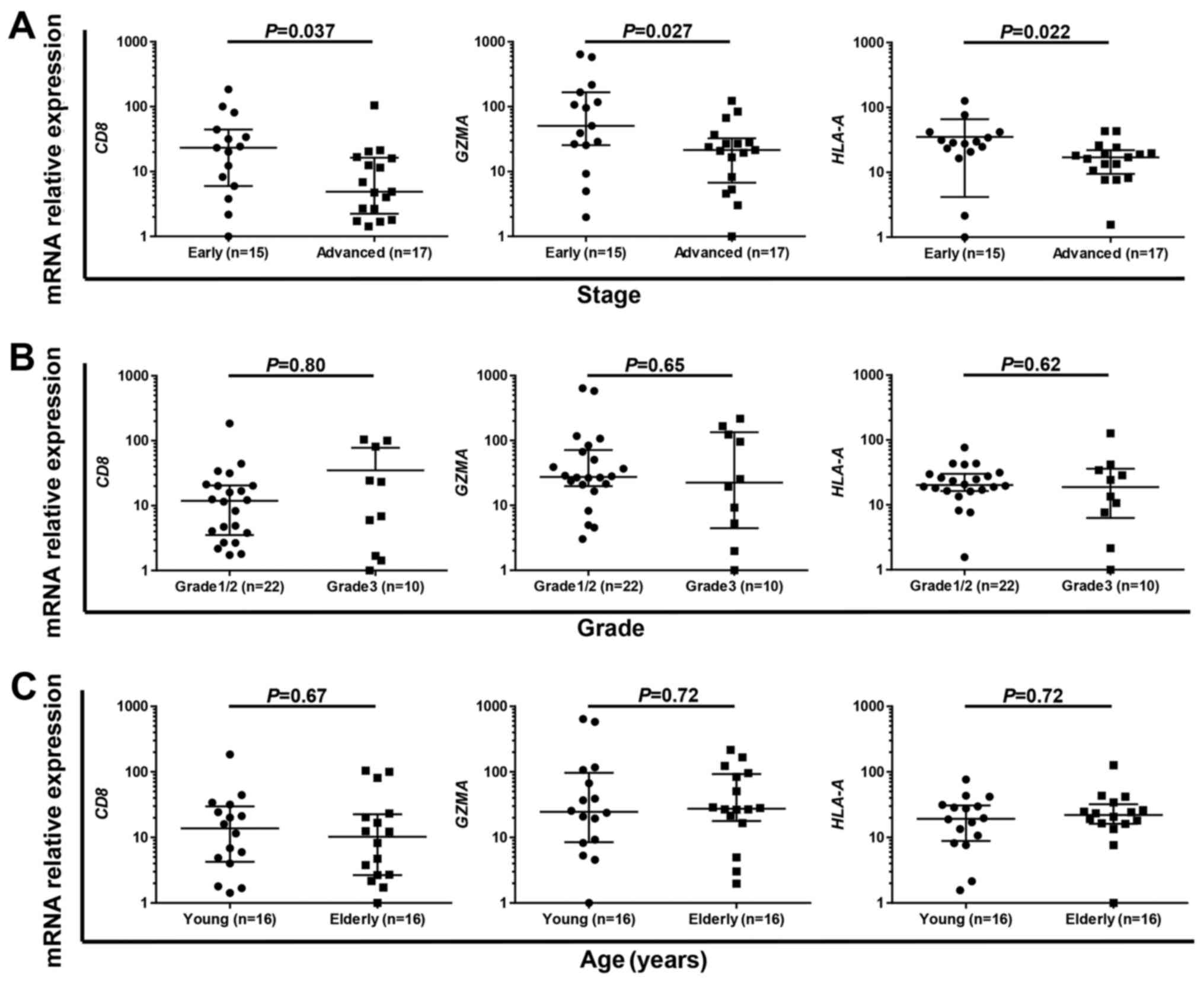|
1
|
Siegel RL, Miller KD and Jemal A: Cancer
statistics, 2016. CA Cancer J Clin. 66:7–30. 2016. View Article : Google Scholar : PubMed/NCBI
|
|
2
|
Salvesen HB, Haldorsen IS and Trovik J:
Markers for individualised therapy in endometrial carcinoma. Lancet
Oncol. 13:e353–e361. 2012. View Article : Google Scholar : PubMed/NCBI
|
|
3
|
Creutzberg CL, Nout RA, Lybeert ML,
Wárlám-Rodenhuis CC, Jobsen JJ, Mens JW, Lutgens LC, Pras E, van de
Poll-Franse LV and van Putten WL: PORTEC Study Group: Fifteen-year
radiotherapy outcomes of the randomized PORTEC-1 trial for
endometrial carcinoma. Int J Radiat Oncol Biol Phys. 81:e631–e638.
2011. View Article : Google Scholar : PubMed/NCBI
|
|
4
|
Melero I, Gaudernack G, Gerritsen W, Huber
C, Parmiani G, Scholl S, Thatcher N, Wagstaff J, Zielinski C,
Faulkner I, et al: Therapeutic vaccines for cancer: An overview of
clinical trials. Nat Rev Clin Oncol. 11:509–524. 2014. View Article : Google Scholar : PubMed/NCBI
|
|
5
|
Chen DS and Mellman I: Oncology meets
immunology: The cancer-immunity cycle. Immunity. 39:1–10. 2013.
View Article : Google Scholar : PubMed/NCBI
|
|
6
|
Hicklin DJ, Marincola FM and Ferrone S:
HLA class I antigen downregulation in human cancers: T-cell
immunotherapy revives an old story. Mol Med Today. 5:178–186. 1999.
View Article : Google Scholar : PubMed/NCBI
|
|
7
|
Ohaegbulam KC, Assal A, Lazar-Molnar E,
Yao Y and Zang X: Human cancer immunotherapy with antibodies to the
PD-1 and PD-L1 pathway. Trends Mol Med. 21:24–33. 2015. View Article : Google Scholar : PubMed/NCBI
|
|
8
|
Schalper KA, Velcheti V, Carvajal D,
Wimberly H, Brown J, Pusztai L and Rimm DL: In situ tumor PD-L1
mRNA expression is associated with increased TILs and better
outcome in breast carcinomas. Clin Cancer Res. 20:2773–2782. 2014.
View Article : Google Scholar : PubMed/NCBI
|
|
9
|
Harter PN, Bernatz S, Scholz A, Zeiner PS,
Zinke J, Kiyose M, Blasel S, Beschorner R, Senft C, Bender B, et
al: Distribution and prognostic relevance of tumor-infiltrating
lymphocytes (TILs) and PD-1/PD-L1 immune checkpoints in human brain
metastases. Oncotarget. 6:40836–40849. 2015.PubMed/NCBI
|
|
10
|
Webb JR, Milne K, Kroeger DR and Nelson
BH: PD-L1 expression is associated with tumor-infiltrating T cells
and favorable prognosis in high-grade serous ovarian cancer.
Gynecol Oncol. 141:293–302. 2016. View Article : Google Scholar : PubMed/NCBI
|
|
11
|
Inozume T, Hanada K, Wang QJ, Ahmadzadeh
M, Wunderlich JR, Rosenberg SA and Yang JC: Selection of
CD8+PD-1+ lymphocytes in fresh human
melanomas enriches for tumor-reactive T cells. J Immunother.
33:956–964. 2010. View Article : Google Scholar : PubMed/NCBI
|
|
12
|
Kandoth C, Schultz N, Cherniack AD, Akbani
R, Liu Y, Shen H, Robertson AG, Pashtan I, Shen R, Benz CC, et al:
Cancer Genome Atlas Research Network: Integrated genomic
characterization of endometrial carcinoma. Nature. 497:67–73. 2013.
View Article : Google Scholar : PubMed/NCBI
|
|
13
|
van Gool IC, Eggink FA, Freeman-Mills L,
Stelloo E, Marchi E, de Bruyn M, Palles C, Nout RA, de Kroon CD,
Osse EM, et al: POLE proofreading mutations elicit an antitumor
immune response in endometrial cancer. Clin Cancer Res.
21:3347–3355. 2015. View Article : Google Scholar : PubMed/NCBI
|
|
14
|
Howitt BE, Shukla SA, Sholl LM,
Ritterhouse LL, Watkins JC, Rodig S, Stover E, Strickland KC,
DAndrea AD, Wu CJ, et al: Association of polymerase e-mutated and
microsatellite-instable endometrial cancers with neoantigen load,
number of tumor-infiltrating lymphocytes, and expression of PD-1
and PD-L1. JAMA Oncol. 1:1319–1323. 2015. View Article : Google Scholar : PubMed/NCBI
|
|
15
|
Čermáková P, Melichar B, Tomšová M, Zoul
Z, Kalábová H, Spaček J and Doležel M: Prognostic significance of
CD3+ tumor-infiltrating lymphocytes in patients with
endometrial carcinoma. Anticancer Res. 34:5555–5561.
2014.PubMed/NCBI
|
|
16
|
de Jong RA, Leffers N, Boezen HM, ten Hoor
KA, van der Zee AG, Hollema H and Nijman HW: Presence of
tumor-infiltrating lymphocytes is an independent prognostic factor
in type I and II endometrial cancer. Gynecol Oncol. 114:105–110.
2009. View Article : Google Scholar : PubMed/NCBI
|
|
17
|
Suemori T, Susumu N, Iwata T, Banno K,
Yamagami W, Hirasawa A, Sugano K, Matsumoto E and Aoki D:
Intratumoral CD8 lymphocyte infiltration as a prognostic factor and
its relationship with cyclooxygenase 2 expression and
microsatellite instability in endometrial cancer. Int J Gynecol
Cancer. 25:1165–1172. 2015. View Article : Google Scholar : PubMed/NCBI
|
|
18
|
Scaviner D and Lefranc MP: The human T
cell receptor alpha variable (TRAV) genes. Exp Clin Immunogenet.
17:83–96. 2000. View Article : Google Scholar : PubMed/NCBI
|
|
19
|
Folch G and Lefranc MP: The human T cell
receptor beta variable (TRBV) genes. Exp Clin Immunogenet.
17:42–54. 2000. View Article : Google Scholar : PubMed/NCBI
|
|
20
|
Danska JS, Livingstone AM, Paragas V,
Ishihara T and Fathman CG: The presumptive CDR3 regions of both T
cell receptor alpha and beta chains determine T cell specificity
for myoglobin peptides. J Exp Med. 172:27–33. 1990. View Article : Google Scholar : PubMed/NCBI
|
|
21
|
Jang M and Yew P: Deep sequencing of
T-cell and B-cell receptors with next-generation DNA
sequencersImmunopharmacogenomics. Nakamura Y: Springer; pp. 3–26.
2015, View Article : Google Scholar
|
|
22
|
Yamaguchi R, Inoto S and Miyano S: A TCR
sequence data analysis pipeline: TcripImmunopharmacogenomics.
Nakamura Y: Springer; pp. 27–43. 2015, View Article : Google Scholar
|
|
23
|
Langmead B and Salzberg SL: Fast
gapped-read alignment with Bowtie 2. Nat Methods. 9:357–359. 2012.
View Article : Google Scholar : PubMed/NCBI
|
|
24
|
Lefranc MP, Giudicelli V, Ginestoux C,
Jabado-Michaloud J, Folch G, Bellahcene F, Wu Y, Gemrot E, Brochet
X, Lane J, et al: IMGT, the international ImMunoGeneTics
information system. Nucleic Acids Res. 37:(Database). D1006–D1012.
2009. View Article : Google Scholar : PubMed/NCBI
|
|
25
|
Lefranc MP: IMGT, the International
ImMunoGeneTics Information System. Cold Spring Harb Protoc.
2011:595–603. 2011. View Article : Google Scholar : PubMed/NCBI
|
|
26
|
Yamagami W, Susumu N, Tanaka H, Hirasawa
A, Banno K, Suzuki N, Tsuda H, Tsukazaki K and Aoki D:
Immunofluorescence-detected infiltration of
CD4+FOXP3+ regulatory T cells is relevant to
the prognosis of patients with endometrial cancer. Int J Gynecol
Cancer. 21:1628–1634. 2011. View Article : Google Scholar : PubMed/NCBI
|
|
27
|
Kondratiev S, Sabo E, Yakirevich E, Lavie
O and Resnick MB: Intratumoral CD8+ T lymphocytes as a
prognostic factor of survival in endometrial carcinoma. Clin Cancer
Res. 10:4450–4456. 2004. View Article : Google Scholar : PubMed/NCBI
|
|
28
|
Origoni M, Parma M, DellAntonio G, Gelardi
C, Stefani C, Salvatore S and Candiani M: Prognostic significance
of immunohistochemical phenotypes in patients treated for
high-grade cervical intraepithelial neoplasia. BioMed Res Int.
2013:8319072013. View Article : Google Scholar : PubMed/NCBI
|
|
29
|
Choudhury NJ, Kiyotani K, Yap KL,
Campanile A, Antic T, Yew PH, Steinberg G, Park JH, Nakamura Y and
ODonnel PH: Low T-cell receptor diversity, high somatic mutation
burden, and high neoantigen load as predictors of clinical outcome
in muscle-invasive bladder cancer. Eur Urol Focus. 2:445–452. 2015.
View Article : Google Scholar
|
|
30
|
Jung IK, Kim SS, Suh DS, Kim KH, Lee CH
and Yoon MS: Tumor-infiltration of T-lymphocytes is inversely
correlated with clinicopathologic factors in endometrial
adenocarcinoma. Obstet Gynecol Sci. 57:266–273. 2014. View Article : Google Scholar : PubMed/NCBI
|

















